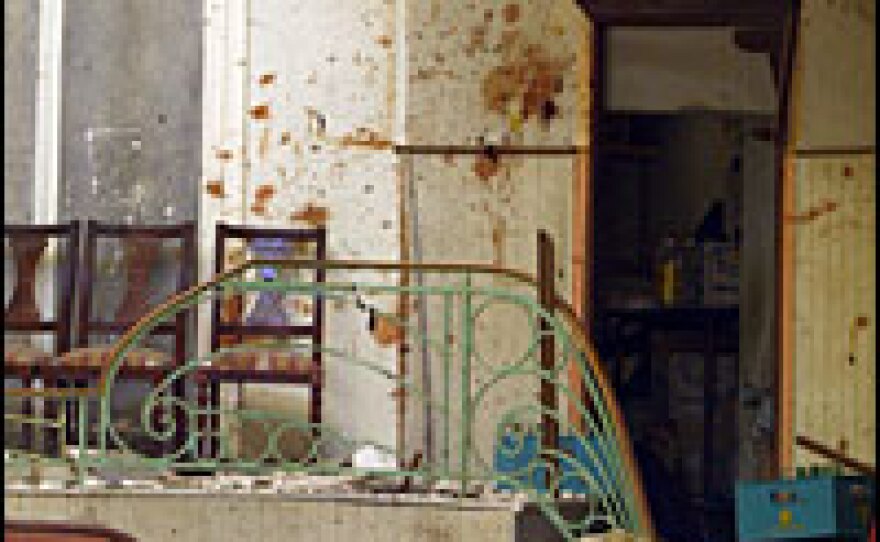
When bomb blasts rocked Casablanca in the spring of 2003, killing 45 people, counterterrorism officials warned that al-Qaida was attempting to open a North African front in the war on terror.
More attacks followed, and Islamist groups in Algeria and Libya changed their names to reflect a new allegiance to al-Qaida.
Five years later, experts and officials say a North African wing of al-Qaida has largely failed to materialize, with groups serving mainly to send potential fighters to Iraq and Afghanistan. Most North African governments have contained or subdued their Islamist threats, but critics say they've done so by severely curtailing civil rights and democracy efforts.
Returning To Normal
On a busy morning in a Casablanca public market, musicians and sidewalk vendors squeeze between the market stalls as local shoppers and tourists stream by. In the years since the string of suicide bombings brought al-Qaida-style bloodshed to this city, life has regained its normal rhythms.
Morocco — once labeled Europe's biggest source of terrorism by a Spanish judge — has arrested hundreds of suspects and prevented radical Islamist groups from mounting a sustained terror campaign. Four suicide explosions last year caused few fatalities, killing the bombers and one policeman.
Analyst Mohammed Ben Hamou, head of the Moroccan center for strategic studies, says better intelligence and a large allocation of resources have helped the security services keep violence at a manageable level.
"I think that until now, they have success," Hamou says. "From time to time, the security service finds a small group here, and small group here. Let's say that's something we will live with for years — will not stop today."
From Casablanca to Tripoli, Islamist groups have embraced al-Qaida's ideology and tactics, with limited success.
The most active is the Algerian group Al-Qaida in the Islamic Maghreb. Experts note that the Algerian Islamists have more than a decade of experience trying to topple their government, and they've been able to absorb new recruits from around the region.
Crushing Islamic Movements
One reason those recruits are available is because other would-be al-Qaida branches in North Africa have been largely stifled.
In Tunisia, where President Zine El Abidine Ben Ali recently announced he will run for a fifth term, authorities have moved to crush all Islamic movements, both moderate and radical.
When two Austrian tourists were kidnapped in Tunisia earlier this year, it turned out that Algerian gunmen were responsible.
In Libya last fall, the Islamic Fighting Group, or FIG, announced that it, too, was aligning with al-Qaida. But the authoritarian regime of Moammar Gaddafi has ruthlessly stifled Islamist militants there.
Dia Rashwan, an Egyptian expert on Islamist movements, says recent reports that Libyan militants may renounce violence raises the question: What violence is there to renounce?
"No, there is no violence in Libya itself, you know?" Rashwan says. "The majority of Libyans are already outside — joining al-Qaida itself, the headquarters, or some of them already arrested or killed in Iraq as volunteers. Libya itself doesn't suffer from the Fighting Islamic Group."
No Sign Of Letting Up
Despite their successes, North African governments show no sign of easing their grip. Morocco's ambassador to the United States, Aziz Mekouar, told a Washington audience in June that the kingdom worries the Islamist cells are sending recruits to fight elsewhere and getting involved in a range of criminal activity:
"We think that this mix of terrorism, illegal migration, trafficking in persons, trafficking in drugs — it's becoming real dangerous," Mekouar said. "And the big danger is that the money of drugs and human trafficking will be poured into the terrorism movements."
But a number of analysts and officials argue that there is another challenge facing Morocco, one that is not getting much attention at this point.
While terrorist attacks are down in both number and severity, public protests over soaring prices and miserable living standards are on the rise.
Demonstrators range from college graduates demanding jobs in the capital, Rabat, to poor Moroccans rioting in towns from Sidi Ifni in the South, north to Sefrou.
The protests involve a variety of complaints, but many stem from the fact that the terrorist threat in 2003 prompted the authorities to halt King Mohammed VI's program of political reform. As a Western diplomatic source in Rabat said, "The much-vaunted process of Moroccan reform has taken a step back."
Professor Mohammed Dariff, of King Hassan II University in Mohammedia, says that in the shock of the 2003 bombings, Moroccans stayed quiet as the authorities cracked down on virtually all forms of dissent.
But five years later, confidence in the government is falling and the most recent riots in Sidi Ifni could spread.
"Morocco has a long history of violence," Dariff says at a busy Casablanca cafe. "We could mention the Casablanca riots in 1965 or in 1981 or the events in Fes in 1990. In our collective consciousness, there are many bad memories of demonstrations and general strikes."
Even with its reform program stalled in recent years, Morocco remains light-years ahead of Algeria, Tunisia or Libya. Western and regional analysts say that, in general, these governments have been right to make security a priority in the face of the al-Qaida threat. But they wonder if the resulting repression is sowing the seeds of future unrest that could prove every bit as destabilizing as a terror campaign.
Copyright 2022 NPR. To see more, visit https://www.npr.org. 9(MDAzMjM2NDYzMDEyMzc1Njk5NjAxNzY3OQ001))







